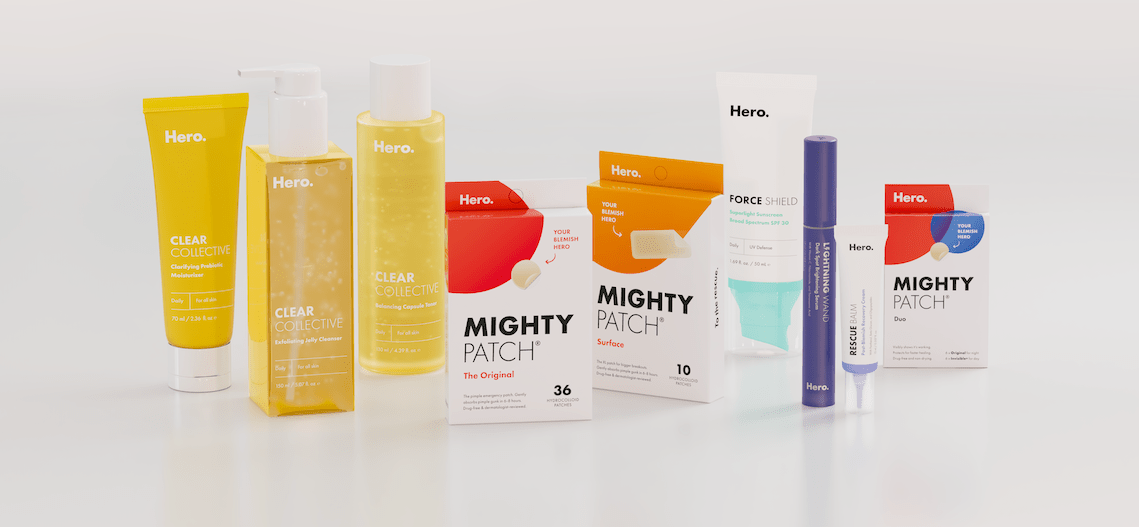On Monday, acne care brand Hero Cosmetics expanded to Ulta Beauty after hitting $100 million in revenue in 2021.
Prior, Hero Cosmetics had one product selling through Ulta Beauty, its Mighty Acne Patch hero product. Now, it’s adding eight products to over 1,260 Ulta Beauty stores and Ulta.com. The assortment includes a spot treatment, an SPF, a cleanser, a toner and a moisturizer.
Hero’s in-store merchandising strategy is to saturate a store with as much Hero as possible. in order to get in front of customers and stay top of mind, said Ju Rhyu, co-founder and CEO of Hero Cosmetics. At Ulta Beauty, the patches were sold near the checkout, in the travel and impulse purchase section.
“With retailers like Target or Ulta Beauty, [the strategy] is going to be about moving out of the aisle,” said Rhyu. “My vice president of sales always says, ‘I want people to trip over us every time they’re in-store.’”
Hero’s 2022 focus areas are similar to its 2021 strategy: to continue to grow at existing partner retailers like Target (where it has sold since 2019) and Amazon, and increase brand awareness. At the end of February, Hero will have end caps and side-cap displays at Target and Ulta Beauty. Hero is also in the mini and travel-size sections at both retailers. Hero’s revenue is 10% DTC e-commerce and 90% wholesale retail and Amazon.
With marketing and brand awareness, Hero has focused on TikTok influencer gifting and paid ads on the platform, and is currently evaluating OTT ads on Amazon and Hulu. For sampling, Hero relies on subscription beauty boxes like Birchbox and FabFitFun, retailers like Target, and its own DTC e-commerce. Rhyu said customers often discover the brand in-store.
“As our guests continue to lean on us for efficacious, convenient, affordable and personalized acne product solutions, we know these new offerings will be the perfect complement to their routine, no matter where they are on their skin-care journey,” said Penny Coy, vp of merchandising at Ulta Beauty, in a statement to Glossy.
Ad position: web_incontent_pos1
Rhyu said that 2021 was also focused on building out the brand’s internal operations and executive roles, like a vp of marketing and a vp of finance. The brand’s headcount was doubled to approximately 50 people. By the end of 2022, it will be at around 60 people.
As the brand has grown to $100 million in revenue, it is now ripe for acquisition. The 5-year-old brand has been profitable since the first year, said Rhyu. In Nov. 2020, private equity firm Aria Growth Partners invested an undisclosed sum in Hero Cosmetics. Aria Growth Partners typically invests between $5 million and $25 million for minority stakes.
At the end of 2021, Hero Cosmetics also commissioned a brand study to learn how it stacked up, compared to peers, and to inform its 2022 focus. The study was conducted by an undisclosed agency and with 2,000 people, who were both Hero Cosmetics customers and people the agency solicited for the study. Hero found that 75% of customers who buy a box of Mighty Patches go on to buy additional products from the brand. According to her, a box of Mighty Acne Patches sells every three seconds.
Brand awareness was on the same level as peers like Mario Badescu, Versed and Thayer’s Naturals. A strategy that Hero has applied to encourage the purchase of other products is promotion and discounts of non-Patch products during sales moments like Black Friday and Cyber Monday.
“This business can be a billion-dollar revenue business, because we’re hitting wide scale with really tight distribution and tight SKU count,” said Rhyu. “It’s a question now of, ‘How are we going to get there?’ Maybe it’s with a partner, maybe it’s alone. Is IPO [an option]? All options on the table.”




